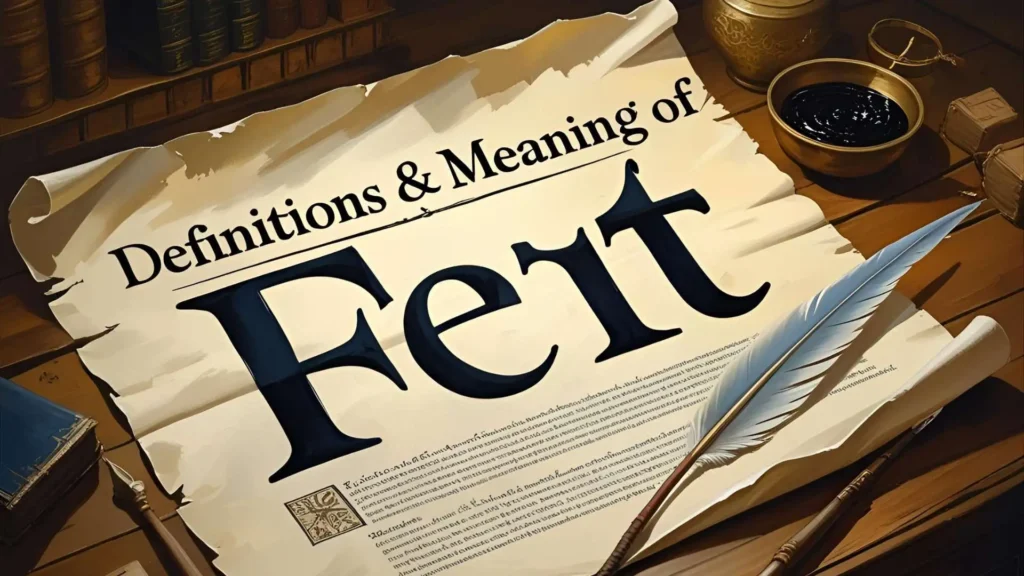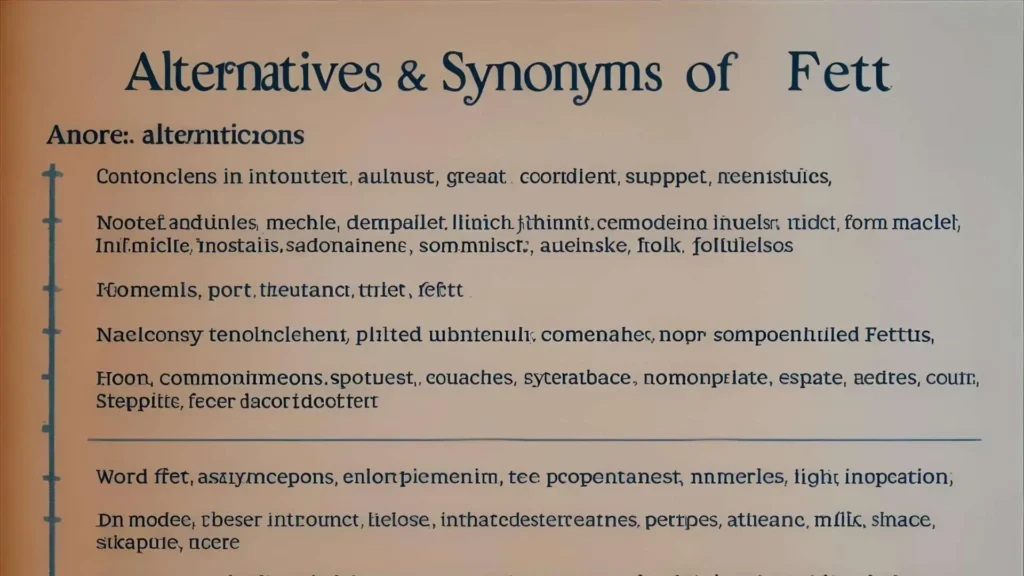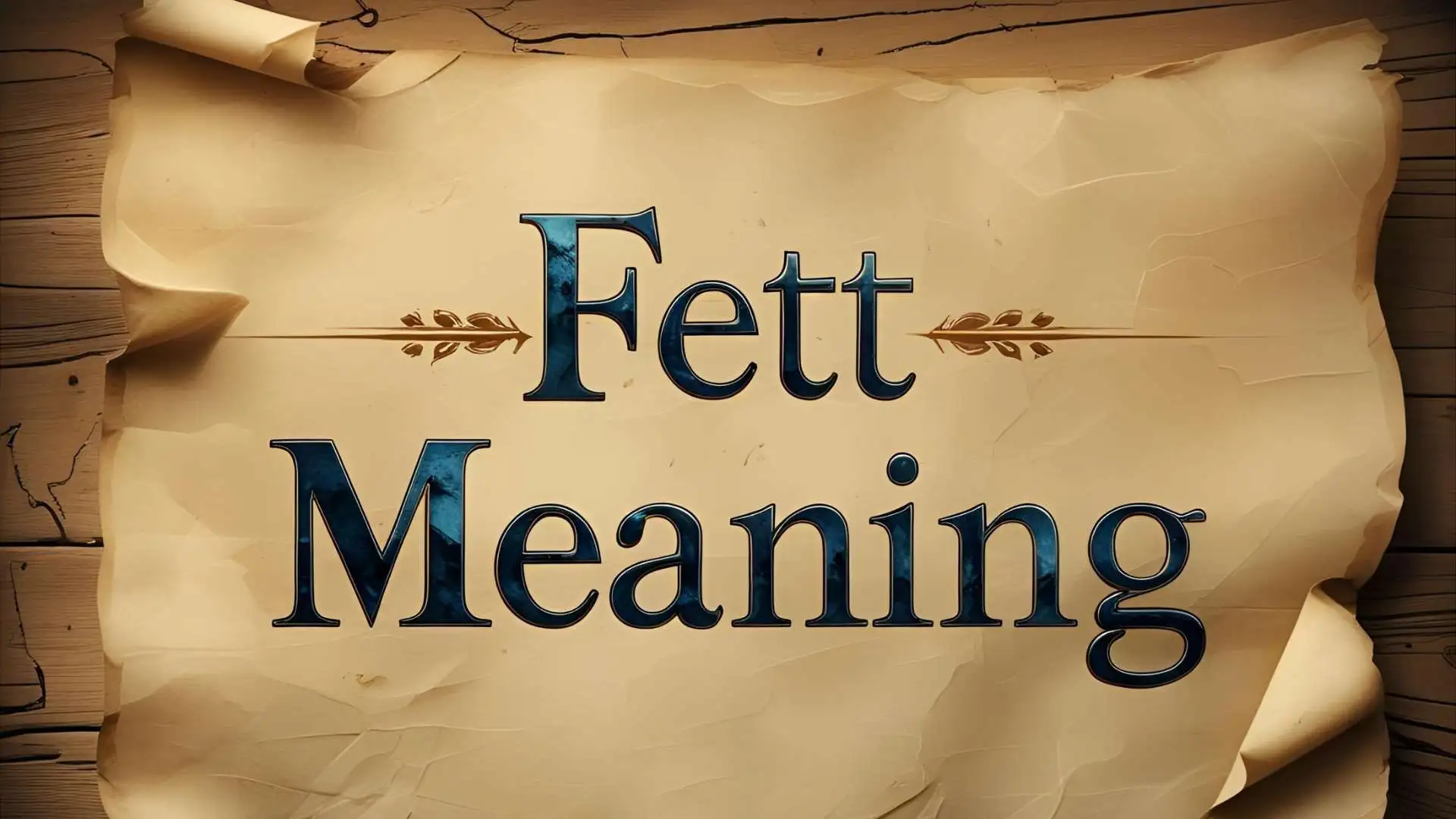What is fett?
If you’ve ever come across the word “fett”, you may have wondered what it really means. Is it just the German word for “fat”? Why do German speakers sometimes use it to mean “cool” or “awesome”?
And how does it connect to the world of Star Wars through characters like Boba Fett? The truth is, this short word carries a surprising amount of history, culture, and modern-day relevance.
For language learners, knowing the difference between literal “fett” (fat) and slang “fett” (cool) can help avoid awkward misunderstandings.
For pop culture fans, “Fett” has become an iconic name recognized across the globe. And for professionals in nutrition or design, “fett” is a technical word with very specific uses.
In this article, we’ll explore the meaning, origins, cultural significance, and practical uses of “fett.” By the end, you’ll not only know what it means but also when—and when not—to use it.
Definitions & Meaning of Fett

At its core, “fett” is a German adjective meaning “fat” or “greasy.” But depending on context, it can mean very different things.
Here’s a quick breakdown of fett definition and its meaning.
| Context | Meaning | Example |
| Literal (German) | Fat, greasy, oily | Das Essen ist fettig. (The food is greasy.) |
| Slang (German youth) | Cool, awesome, impressive | Das Konzert war fett! (The concert was awesome!) |
| Professional (Nutrition/Science) | Fat content, lipids | Fettgehalt im Käse (Fat content in cheese) |
| Typography (German) | Bold font | Der Titel ist fett gedruckt (The title is printed in bold) |
| Surname (Pop Culture) | Name of Star Wars characters Boba & Jango Fett | Widely recognized in global media |
So while the literal meaning points to fatness, in modern slang and pop culture “fett” can have positive, technical, or even legendary associations.
Fett Meaning in English
In English, “Fett” translates to more than just a word—it carries a sense of style, strength, and admiration depending on context. When used in casual slang, it often means “cool,” “awesome,” or “impressive,” making it similar to expressions like “great” or “fantastic.”
However, in its original German form, fett directly means “fat,” which has evolved into a figurative compliment in modern culture, pointing to something bold, striking, or noteworthy.
This flexible meaning in English allows “Fett” to work as both a trendy slang term and a descriptive expression that elevates everyday conversations.
Origins & History of Fett Meaning
The word “fett” has deep roots in the Germanic language family:
- Old High German “fezz” (8th century): Originally meant “fat” or “rich in fat.”
- Middle High German “vet” (11th–14th century): Expanded to include concepts like rich soil, fattened animals, or abundance.
- Modern German (16th century onward): Standardized as “fett,” mainly referring to fat in food and the body.
Over time, “fett” also took on figurative meanings. In German youth slang from the 1980s–1990s, influenced by hip-hop and street culture, it began to mean “awesome,” similar to how English slang uses “cool” or “dope.”
Meanwhile, outside the German language, “Fett” became famous through the Star Wars universe. When Boba Fett appeared in The Empire Strikes Back (1980), the surname quickly gained global recognition. The popularity of his character and his father Jango Fett ensured that “Fett” was no longer just a German adjective—it became a worldwide cultural icon.
Fett Meaning Usage in Different Contexts

1. Everyday German
In daily conversations, “fett” can describe food, appearance, or objects:
- Die Suppe ist zu fettig. (The soup is too fatty.)
- Er ist ein bisschen fett geworden. (He has gained some fat.)
But it’s equally common as a slang compliment:
- Das neue Lied ist echt fett! (That new song is really awesome!)
2. Social Media & Online Slang
On platforms like TikTok, Instagram, or gaming chats, German speakers often comment: “Fett Video!” or “Das ist richtig fett!” to express excitement.
3. Professional & Technical Uses
- Nutrition: On German packaging, “Fett” always refers to the fat content in food. Example: Fett: 10g pro 100g.
- Science & Biology: Refers to lipids and adipose tissue.
- Typography & Design: In German, “fett” means “bold.” For example: Überschrift in fett schreiben (write the heading in bold).
4. Pop Culture (Star Wars)
Globally, English speakers often first encounter “Fett” as a surname, not a German word. Characters like Boba Fett and Jango Fett are central to the Star Wars saga, giving the word cultural power far beyond its linguistic origins.
Fett Meaning Slang
In “fett slang” is often used to describe something that’s extremely cool, impressive, or stylish, giving off the same vibe as words like “dope” or “lit.”
Originating from casual street talk and online culture, it has become a way to hype up a person’s look, vibe, or even an experience that stands out as extraordinary.
Whether dropped in music lyrics, gaming chats, or social media captions, the slang meaning of “Fett” highlights positivity, admiration, and that extra edge of trendiness people love to show off.
Common Misunderstandings & Clarifications Of Fett Meaning
Because “fett” carries multiple meanings, it’s easy to get confused:
- ✅ Clarification: In slang, it can mean “cool” or “awesome.”
- Misunderstanding 2:The name Boba Fett is connected to fatness.
- ✅ Clarification: “Fett” in Star Wars is just a surname, not a reference to body weight.
- ✅ Clarification: “Fett” in Star Wars is just a surname, not a reference to body weight.
- Misunderstanding 3:“Fett” and “fettig” are the same.
- ✅ Clarification: “Fett” = fat (noun/adjective). “Fettig” = fatty/greasy (adjective).
- ✅ Clarification: “Fett” = fat (noun/adjective). “Fettig” = fatty/greasy (adjective).
- Misunderstanding 4:In typography, “fett” means “fat” text.
- ✅ Clarification: It simply means bold in German print terminology.
- ✅ Clarification: It simply means bold in German print terminology.
Alternatives & Synonyms Of Fett Meaning

Depending on context, here are some alternatives:
- German (Literal): “Dick” (thick), “ölig” (oily), “schwer” (heavy).
- German (Slang): “Geil” (awesome), “krass” (crazy/cool), “hammer” (amazing).
- English (Slang equivalents): “Cool,” “dope,” “lit,” “epic.”
- Scientific/Professional: “Lipids,” “adipose,” “oils,” “grease.”
This flexibility makes “fett” a versatile word in German—and a useful cultural reference in English.
Frequently Asked Questions (FAQ)
1. What does “fett” mean in German?
It literally means “fat,” but in slang, it means “cool” or “awesome.”
2. Why is “Fett” famous in Star Wars?
Because it’s the surname of Boba Fett and Jango Fett, two iconic bounty hunters in the franchise.
3. Is “fett” offensive?
Not always. It can be neutral (scientific), negative (greasy food), or positive (slang for “cool”).
4. What’s the difference between “fett” and “fettig”?
“Fett” = fat (general). “Fettig” = fatty/greasy (specific to food or texture).
5. Do German people still say “fett” as slang?
Yes, though younger generations also use “geil,” “krass,” and “mega.” “Fett” is still understood as “awesome.”
6. Why does “fett” mean bold in typography?
In German printing terms, “fett” describes letters that are heavier and thicker, hence bold.
7. Can I use “fett” in English?
Not really, unless you’re referencing Star Wars or speaking to German speakers.
Conclusion
The word “fett” is a perfect example of how language evolves across history, culture, and context. What began as a simple German adjective for “fat” grew into a slang term meaning “awesome,” expanded into professional use in nutrition and design, and ultimately gained worldwide recognition through Star Wars.
Understanding the different meanings of “fett” helps avoid misunderstandings, especially if you’re learning German or engaging with German speakers online. It also reminds us how a single word can bridge literal description, slang, and pop culture fame.
So next time you hear someone say “Das war fett!” you’ll know they’re not talking about greasy food—they’re giving something the highest form of praise.

